|
 |
Events
- The Centre for Applied Research in Jena is hosting
an event on the topic of "Securing
intellectual property" on 12 June. After
a general introduction, the focus is on technical
property rights, design and trade marks as well as
search options. The lecture will be held in German
with English-texted slides. It will be streamed
online. The Leibniz Association also offers three
detailed (German) tutorials
on the topic. (Illustration above:
Adobestock.com/jirsak)
- The Thuringian
RDM Days, an online conference on
research data management, will take place on June 18
and 19. The two-day event is aimed at all Thuringian
researchers, regardless of their level of
qualification. This year's motto is "Becoming
literate in the Data Universe".
- The Postdoc
Days of Jena University will take place
from 18 to 20 June. Some events are also of interest
to doctoral candidates, e.g. the English talk
"Leadership in business". There will also be an
exclusive english-speaking tour to the future Carl
Zeiss AG high-tech site.
- Outstanding researchers are invited to Jena as
part of the CZS
Honorary Guest Lecture. On 19 June,
microbiologist Pascale Cossart from the Institut
Pasteur in Paris will give this Honorary Guest
Lecture. She will talk about her research on the
Listeria bacterium which led her to develop a novel
model system. For her research, Cossart has received
several international prizes and was recently a
visiting professor at Harvard Medical School.
- The doctoral candidates of the Jena School for
Microbial Communication (JSMC) organise an international
conference on the subject of microbial
communications. It will take place from 2 September
to 4 September on the Ernst Abbe Campus. In addition
to the scientific lectures, there will be workshops,
poster sessions, exhibition stands by industrial
producers, as well as cultural offerings to get to
know Jena. You can register here.
|
|
|
 |
Get
involved
- For our photo competition "Hats off!" we
have received photos of 16 creative doctor's hats.
You can find all the photos and descriptions here.
But it's not up to us to decide which hat is the
most beautiful! You can vote until 18 June. The
winners will be announced at the graduation
ceremony on Schiller Day (28 June).
- During the summer term 2024, the online
elections of the doctoral council (DR.FSU)
and the Board of the Graduate Academy will be taking
place. The election will be held from 6 June, 14:00
h, to 17 June, 14:00 h. Using your URZ login, you
can vote on this
website. After the login, you will find
"Gremienwahlen" in the left menu. All nine
candidates for the doctoral council can be found here.
- The Jena
Alliance supports self-organized
networking events of doctoral candidates with
up to 1,000 Euro per event day. The funding can be
used to reimburse costs such as speaker fees, room
rental, travel expenses, public relations materials
or catering. Eligible to the funding
programme are doctoral researchers within the
Jena Alliance and its affiliated graduate schools.
Applications are possible all year round.
|
|
|
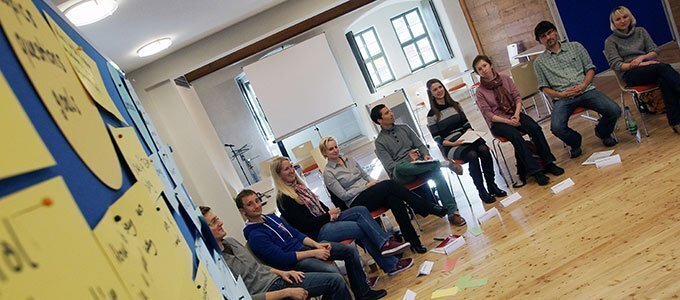 |
Qualification
offers
There are still vacancies in the following online and
on-site workshops:
- Graduate Academy:
- Lehre Lernen (in German):
- Service Centre for Research and Transfer (in
German):
- Competence Center Digital Research (zedif):
- Lichtwerkstatt Jena:
|
|
|
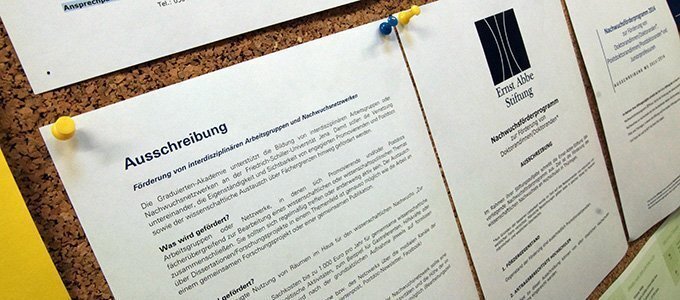 |
Announcements
- The Friedrich Schiller University Jena is
announcing its 2025 State
Graduate Scholarships. The duration of
these doctoral scholarships is three years. An
extension for a fourth year is possible. The amount
of the scholarship is at least 1,400 Euro per month.
The application deadline is 27 September.
- The interdisciplinary Rowena
Morse Mentoring programme supports
female doctoral candidates (in the final phase of
their doctorate) and postdocs (in the orientation
phase) in planning their career. During the 12-month
programme, mentees network with each other, attend
workshops for further training and receive
individual advice from experienced professors of
Thuringian universities in group mentoring sessions.
Application deadline for the programme is 18 August.
- The Graduate Academy offers four certificate
programmes for which you can apply now.
The following programmes are offered: Leadership in
Academia, Leadership in Industry and Society,
Science Management and Start-up Management. To
obtain the certificates, you must complete six
workshops from the Graduate Academy's qualification
programme. Participants will be given preference in
enrolling in the courses. Applications are possible
until 19 June.
- The Jena
Alliance "Life in Focus" announces the Siegfried
Czapski Publication Prize for young researchers.
The prize, endowed with 2,000 EUR, recognizes an
outstanding interdisciplinary publication in an
internationally renowned journal that is located at
the interface of the university's LIGHT and LIFE
profile lines. Eligible are doctoral candidates and
postdocs. Applications can be handed in until 31
July.
|
|
|
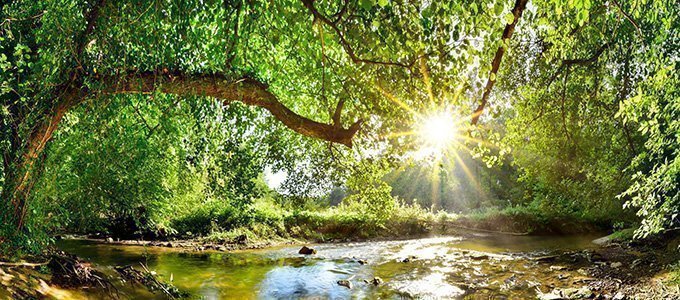 |
This
may be of interest to you
- Working in academia is sometimes like surviving in
the jungle. That's why Kai Noeske, Benjamin Rott and
Katrin Hille have now written a "Survival Guide
Science: (survival) tips for academic
careers". The German book is divided into the
individual career stages and a research toolkit,
e.g. survival at conferences, in the publication
process or when writing proposals. The book can be
read online
free of charge. By the way: For all those who
are a little tired of the fight for survival, the
German podcast "Exhausted
Science" is available since February.
- In mid-May, the German public broadcaster ARD
launched a participatory campaign which is
scientifically assisted by Friedrich Schiller
University Jena: People across Germany were asked to
take photos of rivers and streams and to
answer questionnaires
about their condition. The situation is probably not
everywhere as idyllic as in the symbolic picture
above (Adobestock: Günter Albers). This has already
led to an interactive
map with over 1,000 streams. The results of
the participatory campaign will be broadcast in an
ARD documentary on 23 October.
- Just like Columbia
University in New York, a pro-Palestinian
protest camp at the Free
University in Berlin was also closed down
after a short time. In an open letter, more than 300
academics from the FU Berlin took a stand against
the eviction. Federal Education Minister
Stark-Watzinger said
that this left her "speechless". Another protest
camp was
closed down at Berlin's Humboldt University
shortly after it had been set up – however, the
eviction was ordered by local Berlin politicians,
while the university was more interested in
dialogue. The relationship between politicians and
university management is currently tense.
The German Rectors' Conference is
calling for more respect for university
management. It seems that it has become
difficult to discuss the Israel-Palestine
conflict constructively.
- The
reform of the Academic Temporary Employment Law
will soon be discussed in the Bundestag. The
proposal introduced by the FDP-led Federal Ministry
of Education would have allowed an initial
fixed-term contract of four years after the
doctorate and an extension of the contract by two
years, under the condition that there is a permanent
contract following. The Council of the federal
states has
now commented on this 4+2 rule: It demanded
that the current 6-year rule should continue to
apply for researchers who intend to do a
habilitation. However, even if the approval of the
Council is not required for changing the law, the
statement is regarded as an indicator of the
changing positions of the coalition parties.
|
|
|
 |
Short
query
Hate speech,
hostility towards academia and populist campaigns
against researchers have rarely been investigated to
date. A recent
survey has now analysed forms, extent and
experiences of anti-academic hostility. 70% of the
researchers see an increase in hostility towards
academia in recent years. 45% have experienced at least
one form of hostility towards science. The most common
forms were derogatory remarks, doubting competence
through belittling and hurtful criticism (35%) and
inappropriate reactions to academic findings (28%).
In this context, we are interested in the situation at
the University of Jena. We would be delighted if you
would take part in a short survey to give us an insight
into whether you are also affected by hostility towards
academia. Participation is possible until 21 June.
To our query
|
|
|
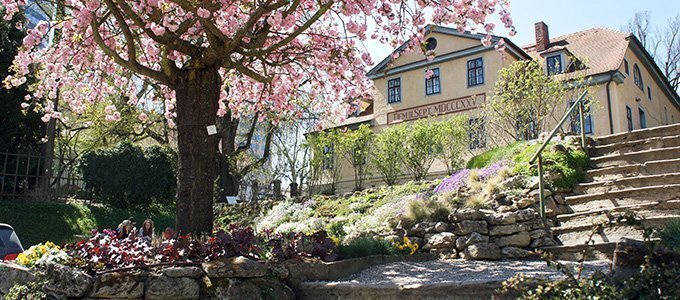 |
News
from University of Jena
- From now on, it
is no longer important for enrolment whether
an employment contract exists. Previously, only
those who did not work more than 50 percent (or 65
percent at a research institution) could enrol. This
regulation has been revoked by a change to the
university's matriculation regulations: All accepted
doctoral candidates can now enrol. Enrolment offers
a number of advantages, e.g. the integration of the
Deutschlandticket (see below), cheaper prices in
canteens, the Kulturticket (free admission to the
art house cinemas and the theater) and software
licenses (e.g. Microsoft Office).
- At the top end of
the botanical garden you will find the so-called inspector's
house (picture: Uni Jena). This historic
building has been extensively renovated in recent
years. It will be reopened as the "Goethe
Laboratory" with an event on 2 July (starting at 6
pm in the auditorium in the main university
building). From 4 July, an exhibition on Goethe's
scientific activities in Jena will
be presented in the building.
- How reliable are
the statements of eyewitnesses? According to
research, this depends on many factors (e.g.
lighting conditions, presence of a weapon, time
interval to the incident). Ulrike Kruse, a
psychology doctoral candidate in Jena, has now produced
several videos in which (theft) offences are
re-enacted. She has also collected images of the
offenders and seven other similar-looking people.
The videos and images are available
online in the Open Science Framework and are
intended to provide the basis for further (global)
research into the reliability of eyewitnesses.
- In mid-May, a referendum
was held among students at the University of
Jena: 95
percent voted that the semester fee should in
future automatically include the reduced Deutschlandticket
(29.40 euros). In order to be able to use the
ticket on public transport throughout Germany,
students would have to download it via the Mein Jena
app. Due to uncertainties regarding the technical
implementation, it is
still unclear whether it will be introduced
next semester.
|
|
|
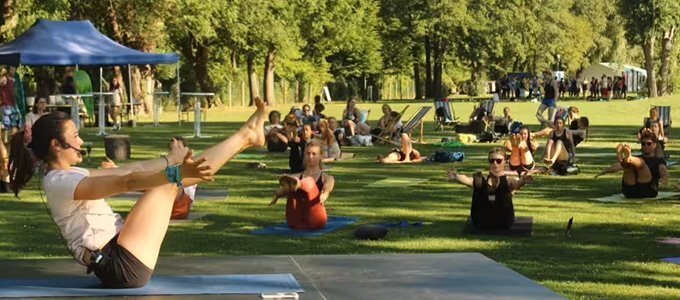 |
Latest
News from Jena city
- The municipal and mayoral elections in
Jena took place on 26 May. You can find the results
of the elections here.
Kathleen Lützkendorf (Greens, 15.4%) and incumbent
mayor Thomas Nitzsche (FDP, 25.3%) reached the
run-off election for the office of Lord Mayor. You
can find information on both of them in detailed
(german) interviews on JenaTV (Lützkendorf,
Nitzsche).
The run-off election will take place together with
the European elections on 9 June.
- The Jena University Sports Department is
organising a yoga
and music festival in Paradise Park on
15 June (picture from last year: Tobias Findeis).
The festival offers the opportunity to learn the
basics of yoga philosophy, gain insights into forms
of meditation and discover different styles of yoga.
The festival will be accompanied by live music on
handpan and harmonium.
- Short news about the upcoming Thuringian state
election:
The Initiative Weltoffenes Thüringen is organizing
so-called local
talks in various towns and villages +++
Starting in summer, there will be a Weimar art
project for the state election in Thuringia
+++ The Verfassungsblog is investigating
what effects an extremist party in the Thuringian
state government could have and will publish the
final results in summer +++ The German lecture
series "Democracy
under attack – findings and antidotes" looks
at the possible reasons for the success of the
right-wing party AfD
|
|